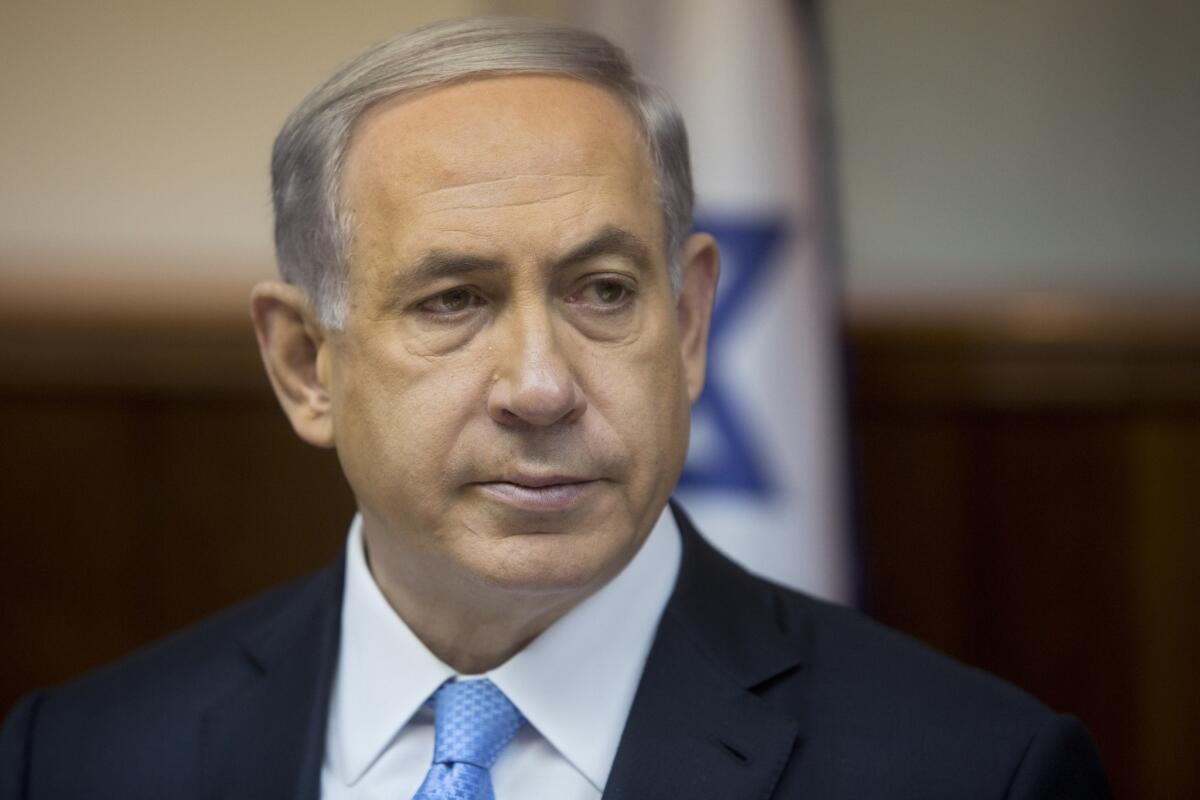Netanyahu agrees to reinstate two Israel Prize judges

- Share via
Reporting from Jerusalem — Following days of controversy that engulfed Israel’s most prestigious national award, Prime Minister Benjamin Netanyahu agreed Friday under an order from the nation’s attorney general to reinstate two judges for the Israel Prize.
Earlier this week, in his temporary capacity as minister of education until after next month’s elections, Netanyahu abruptly removed professors Ariel Hirschfeld and Avner Holtzman from the panel of experts appointed to award the prize for literature and poetry.
A storm brewed as it emerged that Hirschfeld’s signature on a petition supporting Israeli academics refusing military assignments in the Palestinian territories several years ago had flagged him among conservatives as politically undesirable.
Following the dismissals, the remaining judges on the literary panel quit in protest, university presidents voiced concerns about academic freedom and the opposition accused the prime minister of using the awards as an election issue.
Late Thursday, Atty. Gen. Yehuda Weinstein instructed Netanyahu to cease his involvement and reinstate the disqualified judges, rapping him for such moves ahead of the elections.
Netanyahu said he would comply, adding that if he remains as prime minister after the March elections he would form a committee to review criteria for appointing prize judges.
The dispute comes as Netanyahu is already facing political criticism for his plans to speak before the U.S. Congress next month, seen by many here as a bit of electioneering that could strain Israel’s relations with the Obama administration.
Before Weinstein weighed in, Netanyahu had argued that the judges for an award meant to recognize those who made a contribution to Israel in many fields and from all groups of society had increasingly included “more members with radical positions, including anti-Zionist elements supporting refusal of military service.”
He said the prize must represent the country’s diverse fabric “with no political bias whatsoever” and that “pro-Palestinian positions cannot be allowed to dominate certain areas of the Israel Prize.”
Such comments angered many in literary and other circles. A long list of acclaimed writers and scholars nominated for this year’s prize, scheduled to be given out in April, withdrew their candidacy in recent days, including Yitzhak Ben-Ner, David Grossman and Haim Beer.
“This isn’t Soviet Russia, where Stalin awarded the Lenin Prize,” Beer said in a radio interview Thursday, adding he now felt that “not receiving the prize is a higher honor than receiving it.”
Culture Minister Limor Livnat, a veteran politician of Netanyahu’s Likud party and former education minister, dismissed claims of election spin as “nonsense” and said the writers representing an elitist clique of liberals from mostly European descent were politically exploiting the affair.
“The only dictatorship here is the ‘white tribe’ refusing to allow foothold to anyone who thinks differently,” Livnat said, naming a long list of acclaimed Israelis widely believed to have been shunned by the prize committees for being on the other side of the political map.
She and others cited a 2010 report by then-State Comptroller Micha Lindenstrauss, who found a lack of transparency in selecting judges and of diversity among recipients.
According to the report, of the 620 recipients from 1953 to 2009, only 15% were women and five were not Jewish. Only three of the 57 recipients over six decades were not Jews of Ashkenazi, or European, descent.
“There is a problem when so many parts of society are unrepresented,” said Livnat.
Left-leaning lawmaker Zehava Galon, who had petitioned the attorney general to intervene, welcomed the decision that she said blocked Netanyahu’s “dangerous attempt” to politicize the award. Questioning the patriotism of cultural figures and de-legitimizing their work is a marker of “descent into Fascism,” she wrote on Facebook.
While many fear the damage has been done, Hirschfeld told media Friday that if all judges and candidates returned, “there may be a chance of fixing the destruction” of recent days.
Israeli President Reuven Rivlin urged everyone to safeguard the prize that “is a common denominator for all Israeli society, one of the last that remains.”
Sobelman is a special correspondent.
More to Read
Sign up for Essential California
The most important California stories and recommendations in your inbox every morning.
You may occasionally receive promotional content from the Los Angeles Times.










